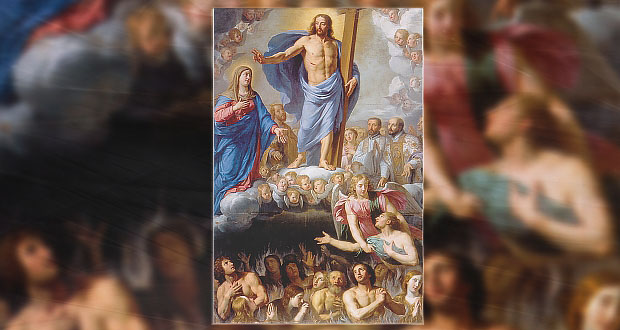We celebrated All Saints’ Day on November 1st, and All Souls’ Day on November 2nd. These two holy days serve as a reminder of the purpose of our earthly lives, and the consequences we face after death, based on how we lived.
On All Souls’ Day, we pray for those who, when they died, still retained sins on their souls, and/or still needed to suffer for a time as punishment to cleanse their souls. On All Saints’ Day, we remember those who attained Heaven, most of whom likely spent time in Purgatory first.
The Mystical Body of Christ, the Church, is composed of those of us still on Earth, those in Purgatory, and those in Heaven. We on Earth are encouraged by the Church to pray for those in Purgatory, and to ask those in Heaven to pray for us. Those we prayed for when they were in Purgatory will certainly pray for us when they reach Heaven.
All Saints’ Day and All Souls’ Day are a reminder of the purpose of our lives, not only what is our ultimate goal, eternal life in Heaven, but also how we should be praying for those who are suffering in Purgatory. These feast days should re-mind us that those we loved in life could be desperate for our prayers to release them from their sufferings in Purgatory, or at least to shorten their time there. Father Hardon, a now-deceased priest, told homeschoolers in a speech that he was afraid no one would pray for him after he died. If a priest who is being considered for canonization needs prayers, then surely everyone needs prayers.
Many of the saints, such as St. Thomas Aquinas and St. Augustine, have encouraged us to pray for those in Purgatory. They have said that when the second Great Commandment instructs “Thou shalt love thy neighbor as thyself,” we must include the suffering souls in Purgatory. In fact, we have an obligation to pray for our deceased family members who have died. This should include not only relatives we remember, but relatives in the distant past. Truly, we should pray for all members of our family back to Adam and Eve! This prayer, even a brief Hail Mary, could be included in the prayers we say after Holy Communion, or included in our Rosary intentions.
Several saints were allowed to see Purgatory. One such saint was St. Magdalen de Pazzi, a Carmelite nun whose body is incorrupt in the church of Carmelite nuns in Florence. St. Magdalen was given a “tour” of Purgatory, witnessing the sufferings of several people there. After that, she encouraged people to bear their earthly sufferings, of-fer them up for the sins of the world, and avoid committing sins for which they must suffer in Purgatory.
St. Francis de Sales, a Doctor of the Church, considered one of the greatest of confessors or counselors of the Church, wrote about Purgatory. He wrote that while there is suffering in Purgatory, there is also a peace and happiness. Those suffering are aware that they will attain Heaven, and that their suffering is God’s way of preparing them, of cleansing them for the incredible joys and happiness of Heaven. In Purgatory, they cannot commit any sins, even the sin of impatience. They love God with a perfect love, and have their guardian angels by their sides.
One of the recurring topics of the saints who have written or spoken about those in Purgatory is the overwhelming awareness of not being with God in Heaven. This suffering of loss, though temporary, is worse, say the saints, than the pains of suffering of fire. St. Teresa of Avila, in her book Castle of the Soul, wrote: “The pain of loss or the privation of the sight of God, exceeds all the most excruciating sufferings we can imagine.”
Father Schouppe, who compiled the book Purgatory, a collection of the writings of the saints about Purgatory, concluded: “They wish to be there in the state wherein God pleases, and as long as it shall please Him. They cannot sin, nor commit slight imperfection. They love God more than they love themselves; they love Him with a perfect, pure, and disinterested love. They are consoled by angels. They are assured of their eternal salvation, and filled with a hope that can never be disappointed in its expectations. Their bitterest anguish is soothed by a certain profound peace. It is a species of Hell as regards the sufferings; it is a Paradise as regards the delight infused into their hearts by charity… Such are the teachings of the doctors [of the Church], from which it follows that if the pains of Purgatory are rigorous, they are not without consolation.”
O Lord God Omnipotent, I ask You by the Precious Blood of Your Divine Son Jesus, that was shed in His bitter crowning of thorns, deliver the souls in Purgatory, and among them all, particularly that soul who is in the greatest need of our prayers, in order that the soul may not be delayed in praising You in Your glory and in blessing You forever. Amen.

 Seton Magazine Catholic Homeschool Articles, Advice & Resources
Seton Magazine Catholic Homeschool Articles, Advice & Resources

